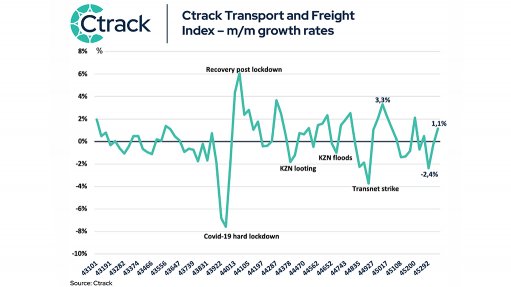Business leaders must declare ‘zero tolerance’ for GBV
This article has been supplied as a media statement and is not written by Creamer Media. It may be available only for a limited time on this website.
Gender-based violence (GBV) should be viewed as a human rights issue by South African companies, who have a vital role to play in eradicating the terrible scourge that is currently gripping our country. Given that businesses operate within society and form a part of the social fabric, companies are far from immune to the social ills that plague our country and should therefore play a strategic role in seeking a solution to these problems.
According to Bridgette Mdangayi and Khanyisa Nomoyi, from the National Business Initiative; “Solutions require a multi-stakeholder approach. Due to the fact that business often sets the tone for what is accepted in society, it has a responsibility to declare a ‘zero tolerance’ approach for GBV in all its forms. There is no easy way to eradicate GBV, but it is important to strengthen existing interventions.”
The 2014 KPMG study ‘Too costly to ignore – the economic impact of gender-based violence in South Africa’ has been widely quoted in the media for highlighting that GBV costs the country more than R28 billion a year, which amounts to 1% of GDP. However, the cost of GBV is far greater than any number can suggest. Survivors of GBV are vulnerable in a number of ways – financially insecure, more likely to be absent from work, and often unable to achieve upward professional mobility – which means there is numerous direct, personal costs to GBV that are seldom recognised.
Violence in South Africa is historical and has infiltrated every aspect of socio-economic life. The crisis of GBV mirrors a patriarchal order that seeks to suppress and prevent marginalised groups from freely participating in the public space, workplaces and economic ownership. Companies must play an active role in undoing the violence that marginalises women and gender-diverse people and take collective action to ensure that perpetrators are brought to book.
Mdangayi and Nomoyi believe that the private sector, which employs and engages with various aspects of society, has a responsibility to display bold leadership on this topic. If companies are serious about addressing GBV, they should take the following interventions into consideration:
- Companies should ensure that their policies on sexual harassment and assault in the workplace incorporate harm reduction practices that prioritise the support and care afforded to those who speak up while removing the accused from the workplace through appropriate interventions. Policies must be appropriately worded and enforced to create a culture that protects employees from possible harm.
- In instances where cases are reported, grievance structures that are sensitive to the complexity of GBV and power dynamics in the workplace should aim to prioritise the wellbeing of staff and by extension, their families.
- At a broader level, companies have a responsibility to continuously engage with staff and update their policies on matters of GBV in relation to how the work environment can serve as a space that rejects harmful gender roles and patriarchal notions of professional performance. Transformative policies should also look at recovery and healing processes – how a company is able to provide support once an incident is reported is necessary for reintegration back into the workplace.
- Companies should review their structures to accommodate staff at various levels, for example, transport provision for shift work and additional security for female workers who may work unsafe hours.
- Companies can also fund civil society organisations and NPOs focused on addressing GBV in communities and society at large. Such funding should be based on building long-term partnerships, given the complex and pervasive nature of GBV.
- Closing the pay gap is an economically strategic way for companies to provide support for survivors and their families, given that income disparities have been documented as part of the cause for keeping women trapped in abusive circumstances, and therefore provide financial security once they are able to leave the abusive environment. Research on GBV shows that all classes experience violence, but survivors who earn a low income are more vulnerable to poverty and are therefore unlikely to receive the care they need.
Comments
Press Office
Announcements
What's On
Subscribe to improve your user experience...
Option 1 (equivalent of R125 a month):
Receive a weekly copy of Creamer Media's Engineering News & Mining Weekly magazine
(print copy for those in South Africa and e-magazine for those outside of South Africa)
Receive daily email newsletters
Access to full search results
Access archive of magazine back copies
Access to Projects in Progress
Access to ONE Research Report of your choice in PDF format
Option 2 (equivalent of R375 a month):
All benefits from Option 1
PLUS
Access to Creamer Media's Research Channel Africa for ALL Research Reports, in PDF format, on various industrial and mining sectors
including Electricity; Water; Energy Transition; Hydrogen; Roads, Rail and Ports; Coal; Gold; Platinum; Battery Metals; etc.
Already a subscriber?
Forgotten your password?
Receive weekly copy of Creamer Media's Engineering News & Mining Weekly magazine (print copy for those in South Africa and e-magazine for those outside of South Africa)
➕
Recieve daily email newsletters
➕
Access to full search results
➕
Access archive of magazine back copies
➕
Access to Projects in Progress
➕
Access to ONE Research Report of your choice in PDF format
RESEARCH CHANNEL AFRICA
R4500 (equivalent of R375 a month)
SUBSCRIBEAll benefits from Option 1
➕
Access to Creamer Media's Research Channel Africa for ALL Research Reports on various industrial and mining sectors, in PDF format, including on:
Electricity
➕
Water
➕
Energy Transition
➕
Hydrogen
➕
Roads, Rail and Ports
➕
Coal
➕
Gold
➕
Platinum
➕
Battery Metals
➕
etc.
Receive all benefits from Option 1 or Option 2 delivered to numerous people at your company
➕
Multiple User names and Passwords for simultaneous log-ins
➕
Intranet integration access to all in your organisation


















